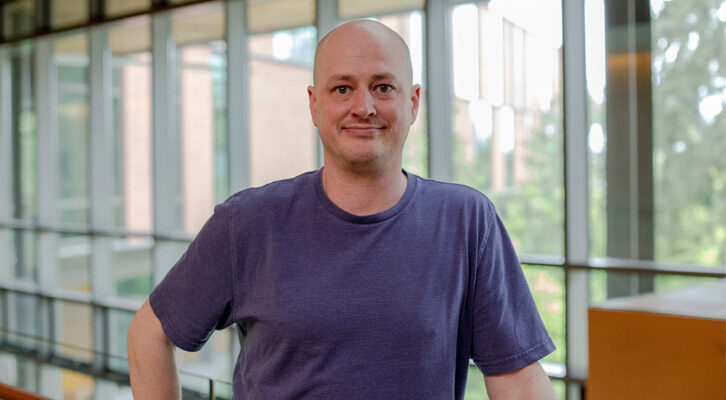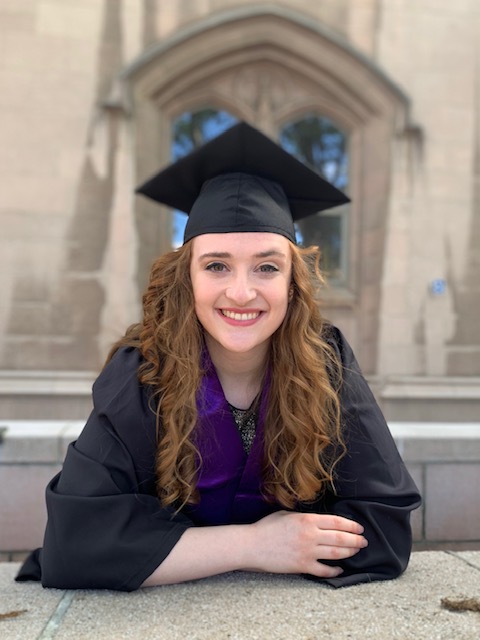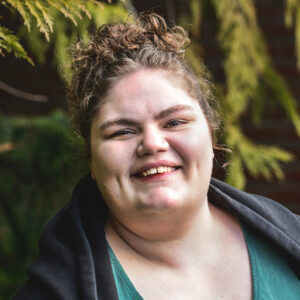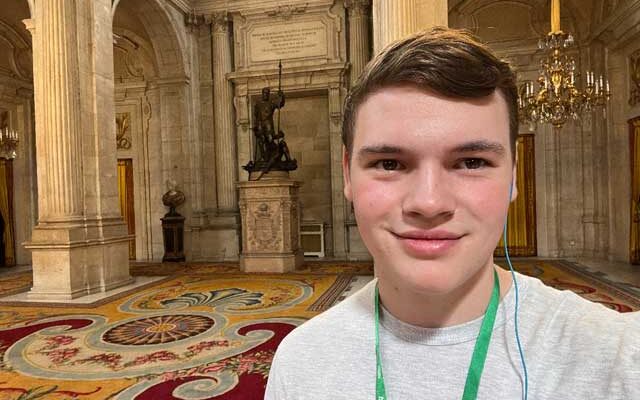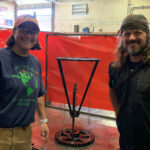My name is Matthew Garner, and I’m a 42-year-old Peninsula College alum, and current Ph.D. graduate student in chemistry at Portland State University.
In the summer of 2010, I had a surfing accident and fractured my cervical vertebra. I was left disabled and unable to physically provide for myself and my family. The next several years were consumed with deep depression and financial uncertainty. After a long and successful career in construction, a job that I loved, I felt empty and questioned what to do next.
The idea of enrolling in the local community college was tossed around during family meetings. I wasn’t optimistic about the possibility of going back to school until I met with an advisor at Peninsula College. As I pondered college as a real possibility, I meditated on my past and present passions and interests. I always was fascinated with chemistry and how matter changes – maybe I could become a chemist? I was completely disabled and I didn’t have too many other options available to me to find a new rewarding career due to my physical limitation, and chemistry is something I could do.
Overcoming Fears
The thought of returning to school created a lot of fear and anxiety because of my age, and cultural, and generational differences. Everyone wants to fit in on some level, and I wanted to fit in and be accepted. I thought the generational gap would hinder my ability to relate and connect to a younger generation, and I would stick out like a sore thumb. Inwardly I wondered, “What if I am not good enough? What if I fail?” Outwardly, I made an effort to smile. I worked to project a carefree, fearless, and positive attitude.
Finding Support
Contrary to my initial anxiety and fears, I found that since I was older I shared life experiences with many of my professors, namely; Dr. Ben Weintraub, Jeff Zirul, Dr. Joel Pankey, Randy Anderson, and Steve Belz. I was told to find what works for me because there is no right or wrong way to approach education.
In my attempt to develop good study habits, I noticed reoccurring advice from my mentors like, don’t get behind, come to lectures prepared by reading or browsing the content beforehand, stay organized, and come to office hours regularly.
I became more comfortable spending time in the math and writing labs, and participating in discussions with, and approaching, my classmates. I soon found that many of my anxieties and fears were rooted in ignorance of the process. Also, I found there were plenty of students my age and even older. Many of my younger cohorts looked up to me because I was older and reached out to me for advice. This made me feel needed, wanted, and happy to be a part of the PC community. After my first year, I had developed many friendships and left with the feeling, “Shoot maybe I can do this. Why not me”?
Discovering the Honors Program
Chemistry Professor Dr. Ben Weintraub noticed my passion for chemistry and offered me an opportunity to work in small research. Working with Dr. Weintraub gave me an appreciation for hands-on research and how it can make real-world impacts. During one of our lab sessions, he suggested I enroll in the Honors Program, in which students were required to develop an independent capstone project.
I discovered the beauty of academic diversity while collaborating with my peers whose areas of interest was much different than mine. The round table discussions during the honors classes were spirited while fostering and exercising critical thinking skills.
Diving Into Research
The Honors Program assigns a facility mentor who aids in guidance, experience, and accountability. Universities perform research, community colleges do not because their main objective is to get a student’s core classes out of the way to transfer to a university, to teach a job skill, or award a certificate. PC’s Honors Program bridges the gap by giving students the ability to learn how to conduct research at the university level. This allowed me to have a considerable head start compared to most of my classmates at Portland State University. I learned how to approach a research project, organize dozens of sources, develop a thesis and a hypothesis, properly analyze the null hypothesis, and critical thinking.
The director of the Honors Program allows great freedom in project scope and choice. This allows students to pursue topics of interest not offered in the course catalog. In my class cohort, some prior projects included, short stories, both fiction and non-fiction, student psychology, salmon habitat restoration, psychology, constructing textbook chapters.
My project focused on building a high-pressure extraction vessel for supercritical carbon dioxide extraction, which required me to do significant research, cite sources, and write a paper on the topic before preliminary approval. Once my project passed the initial preliminary approval, as it had to meet the threshold guideline criteria as a viable and realistic research project, I wrote a prospectus for college grant money and work in close collaboration with the physics and chemistry department. I worked hands-on with a local machine shop for fabrication and set up accounts for all the valves, gauges, and fittings. Once the vessel was fabricated and assembled, we pressure tested it to 5500 psi which is 2.5 times the operating pressure standard with ASME protocol. My mentor during this process and member of the chemistry department at PC, Dr. Pankey, and I were ecstatic when we successfully ran a SCCO2 extraction of spinach back at the lab. The vessel now is used at the college for educational purposes.
At the end of the two-year Honors Program commitment, the college hosts a symposium where the students present their research. While I was going through the program I remember thinking how demanding it was, and how we all pushed each other for excellence, while still managing all the other coursework. There were more than a few times I questioned whether or not I made the right decision because of the challenge. Little did I know that my experience in this program would be by far the most valuable asset in my preparation for grad school entrance. My project centered around chemistry, naturally, because every day I learned more about the behavior of matter, the more passionate I became about the subject. It was becoming more and more clear to my peers, instructors, family, and including myself that I was going to major in chemistry. The skills I acquired from this program prepared me for graduate-level research. I continually find myself drawing from the lessons learned.
Next Steps
I transferred to Portland State University and took with me the skills I gained from Peninsula College and the Honors Program. I noticed right away how much I missed Peninsula College, and feel blessed to have been able to acquire my associate of science with honors there.
It has been difficult to acquire study mates and friends because the lectures have around 200 people. At Peninsula College, the average class size is around 17. The intimate setting makes it comfortable for everyone to reach out to each other. You sit in the same seat, usually next to the same person. The professor knows your name and everyone else’s too. The smaller class sizes allow for more one-on-one time, office hour time, and more investment in each student’s success. Had I gone straight to the university I doubt I would have made it this far.
The Future Awaits
I believe the help that I received at PC is something the faculty and staff would have done for anyone. It has been my experience that whenever a student asks or is putting the work in, the faculty will bend over backward for you. I have so much admiration for the charming community college nestled in at the base of the Olympic Mountains. I hope to someday teach chemistry here.
Who knows? In five years I will have my Ph.D., and will have the chance to give back to the community and the college I love so much. I hope my story helps others find the strength to become the best versions of themselves, and overcome fear and anxiety to accomplish their dreams and goals. Because a dream without a date is just a wish.

